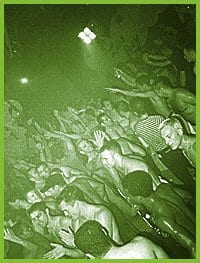There was a brief period in the early to mid-1990s when staid old Toronto was one of the top tourist choices for gay men across North America.
Thanks to establishments like notorious sex bar the Bijou, the backrooms at places like Kurbash and the Barn, the risqué antics that took place at Remington’s and our many bathhouses, we drew visitors from such formerly freedom-loving cities as New York, South Beach and San Francisco for adult fun.
Those days have vanished. The back rooms were all quietly closed, the Bijou and Remington’s were busted in the late ’90s and one of the bathhouses, long considered to be inviolate after the battles that were fought in the early ’80s, was assaulted for, of all things, a lesbian event. Even such harmless and private affairs as the Barn’s naked Sunday get-togethers were attacked.
A number of bars closed but very few new ones opened. Church St’s once renowned party atmosphere is on the wane. And it appears there are a number of people in the neighbourhood who see that as a good thing.
Although Kyle Rae, the only openly-gay city councillor, is an easy target to blame for Church St’s decline, the truth is, Rae’s simply representing his constituents. Those constituents have changed radically over the last eight years. Some of them seem to think that they have the right to demand that a downtown neighbourhood in Canada’s largest city not behave like a downtown neighbourhood in Canada’s largest city. So what happened?
For one, we’ve all gotten older. A great many former club kids and bar flies are now middle-aged men and women whose nights of nocturnal drug taking are long behind them. Just like their straight contemporaries, certain queer people have been stricken with a sort of middle-aged amnesia that makes them feel a good night’s sleep for them on a Friday or Saturday night is more important than a night on the town for a younger generation.
Factor into this a sizeable portion of the populace dealing with health problems and too much time on their hands, then add a new straight demographic that wants to eschew the commute to the suburbs for the convenience of downtown living and suddenly we have a whole new influx of people attempting to force their timetable onto a neighbourhood that has never marched to the same tune, or timetable, as the rest of the city.
There is a rancid whiff of hypocrisy about all of this. Al- though it can’t be denied that the neighbourhood does go through a rather noisy period after last call on the weekends, it must also be said that those of us who work from our homes during the day or make our living in the evening are not given the same consideration as those who work a so-called “typical” nine to five job. Any complaints about daytime noise are not given the same weight.
The complainers would do well to remember that, for some of us, a screaming baby, the endless pitter patter of childish feet on the floor above us, the surround sound television experience from the next apartment, a barking dog left alone for hours on end or loud domestic squabbles are every bit as annoying at 10am as a group of drunk fags outside of Five or Woody’s at 3am.
History has shown, no matter how many clubs are closed, no matter how many relatively safe and private places of sexual congress are closed, the need for certain people to celebrate their lives, their sexuality or their lack of a day job is not going to go away.
To the contrary, these people will find other, less secure places to indulge in these activities. Do we really want to return to the days of sleazy boozecans, illicit sex in public spaces and wandering the very streets people hope to keep quiet because there’s no place to go after last call?
If you live downtown you are occasionally going to be inconvenienced by late night revelry. Toronto is a vast city with many different neighbourhoods, most of them far quieter than the Church St corridor. If the nightlife in the neighbourhood bothers you so much and you’re averse to buying earplugs, then move. There are certainly far quieter areas of the city. Or better yet, relocate to someplace like Edmonton, Calgary or Winnipeg, where the city planners have done such a reprehensible job that the downtown areas after the close of the business day are practically post-nuclear attack in their desolation. You’ll get all the sleep you need there.
If Toronto hopes to become the “world class” city it’s always claiming to be, it’s not going to happen by making it harder for people to have a good time in the downtown core. In fact, our inept and easily frightened mayor and the city councillors who give too much credence to a vocal minority of whiners would do far better to consider making Toronto’s downtown area more liberal than it currently is.
The city should be looking at ways to implement a safe area for our prostitutes and the people who patronize them, the legalization of marijuana and places to consume it, as well as the reopening of sex clubs and enough dance bars that people aren’t forced to line up outside for an hour at midnight.
They might also want to consider extending bar hours so all of the patrons aren’t turned out onto the streets at the same time every night. As Amsterdam and London has proven, a city can and should be a great many things to a great many people. And the one thing any downtown area must be in order to draw people to it is vibrant, alive and, yes, slightly notorious.
If you’re looking for a suburban lifestyle head for the suburbs, honey.
*Brad Fraser will be hosting the show Jawbreaker, on the digital station PrideVision this fall.

 Why you can trust Xtra
Why you can trust Xtra


